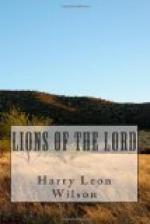He pressed forward again toward the desert, eager to be on with it. The page with the wash of blood across it seemed to take on a new vividness in the stronger light. Under the stain, the letters of the words were magnified before his mind,—“And as ye would that men should do to you—” It seemed to him that the blood through which they came heated the words so that they burned his eyes.
An hour after daybreak the trail led him down out of the hills by a little watercourse to the edge of the desert. Along the sides of this the chaparral grew thickly, and the spring by which he halted made a little spot of green at the edge of the gray. But out in front of him was the infinite stretch of death, far sweeps of wind-furrowed sand burning under a sun made sullen red by the clouds of fine dust in the air. Sparsely over the dull surface grew the few shrubs that could survive the heat and dryness,—stunted, unlovely things of burr, spine, thorn, or saw-edged leaf,—all bent one ways by the sand blown against them,—bristling cactus and crouching mesquite bushes.
In the vast open of the blue above, a vulture wheeled with sinister alertness; and far out among the dwarfed growing things a coyote skulked knowingly. The weird, phantom-like beauty of it stole upon him, torn as he was, while he looked over the dry, flat reaches. It was a good place to die in, this lifeless waste languishing under an angry sun. And he knew how it would come. Out to the south, as many miles as he should have strength to walk, away from any road or water-hole, a great thirst would come, and then delirium, perhaps bringing visions of cool running water and green trees. He would hurry toward these madly until he stumbled and fell and died. Then would come those cynical scavengers of the desert, the vulture wheeling lower, the coyote skulking nearer, pausing suspiciously to sniff and to see if he moved. Then a few poor bones, half-buried by the restless sand, would be left to whiten and crumble into particles of the same desert dust he looked upon. As for his soul, he shuddered to think its dissolution could not also be made as sure.
He stood looking out a long time, held by the weak spirit of a hope that some reprieve might come, from within or from on high. But he saw only the page wet with blood, and the words that burned through it into his eyes; heard only the cries of women in their death-agony and the stealthy movements of the bleeding shapes behind him. There was no ray of hope to his eye nor note of it to his ear—only the cries and the rustlings back of him, driving him out.
At last he gave his horse water, tied the bridle-rein to the horn of the saddle, headed him back over the trail to the valley and turned him loose. Then, after a long look toward the saving green of the hills, he started off through the yielding sand, his face white and haggard but hard-set. He was already weakened by fasting and loss of sleep, and the heat and dryness soon told upon him as the chill was warmed from the morning air.




